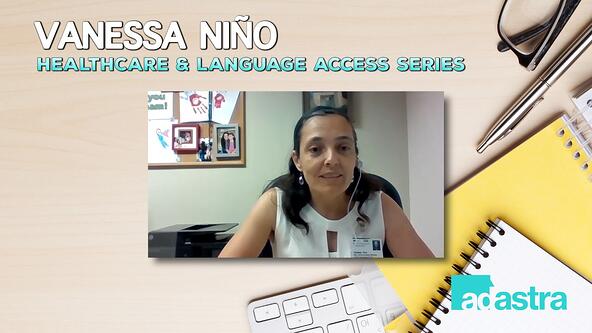Healthcare and Language Access Series: Vanessa Niño Interview – Part 1
Healthcare and Language Access Series

Interpreters are critical to the well-being and health of patients, providers, and families in healthcare settings. That’s because without interpreters, non-English-speaking patients may not get the care they need to handle issues that have sent them to the hospital or doctor’s office. And, now, in the midst of a pandemic, the importance of language access support has become even clearer.
Vanessa Nino, Communication Services at MedStar Washington Hospital Center
Anywhere, Anytime Access to Medical Professionals
In our interview with Vanessa Niño, Communications Services Manager of Medstar Washington Hospital Center, she discusses the ways different modes of language interpretation—over-the-phone, virtual/video, or in-person—may vary by specific patient needs. Niño, a healthcare language access expert, tells us about her career setting up interpretation programs at major hospitals and how she and her team have approached the unique needs of language access for covid-19 patients.
In our interview with Vanessa Niño, Communications Services Manager of Medstar Washington Hospital Center, she discusses the ways different modes of language interpretation—over-the-phone, virtual/video, or in-person—may vary by specific patient needs. Niño, a healthcare language access expert, tells us about her career setting up interpretation programs at major hospitals and how she and her team have approached the unique needs of language access for covid-19 patients.
Telehealth Growing Pains
With the need for keeping people away from one another to stop the spread of covid-19, we have witnessed the growth and adaptation of telehealth. Even many interpreters who traditionally worked on-site alongside patients and providers have been interpreting more via the phone or video.
When the pandemic first began, Niño describes, her team’s goal was to protect the interpreters while providing services, so they were shy to send in-person interpreters to assist non-English-speaking covid-19 patients. “Very quickly, as a team, we realized there was too much missing by us not being in the thick of it; patients were sick and they needed an interpreter,” she said.
What Niño and her team discovered early on in the pandemic was that using telehealth did not always serve covid-19 patients well, since they are often intubated and have trouble breathing. This makes it hard for them to communicate, no matter what language they are speaking. As Niño notes, “For us to expect that somebody who is in that situation is able to hold a phone to their ear and speak through an interpreter, or try to speak on video and somebody is trying to listen to what they said, is difficult.”
Because of this, Niño and her team “really made an effort to be on the frontline with our non-English speakers. . . . We know that it was necessary to have [an interpreter] in person while this person was getting better or while we were talking to family members,” she said. “We felt that [in-person interpretation] made a true difference.”
Patient-specific language access services
That’s not to say that phone and video interpretation aren’t also critical tools to help non-English speakers during this challenging time, and Niño’s hospital used these modes of communication based on the assessment of each patient’s specific needs. For example, they would shift to telehealth when a patient was recovering and/or able to speak audibly.
Niño, who has had a long career establishing and managing language access services in Cincinnati and the Washington, DC metropolitan area, and has a background in interpretation, is passionate about and motivated by providing interpretation services by any means in order to ensure patients understand their health better and are able to take care of their family appropriately.
Below is Part 1 of the interview with Vanessa Niño. And stay tuned for Part 2 next week, where she delves into the painful experience interpreters have faced in the pandemic.
Check out Part 1 of our full length interview with Vanessa Niño below!
.png?width=500&height=483&name=bot%20(1).png)




